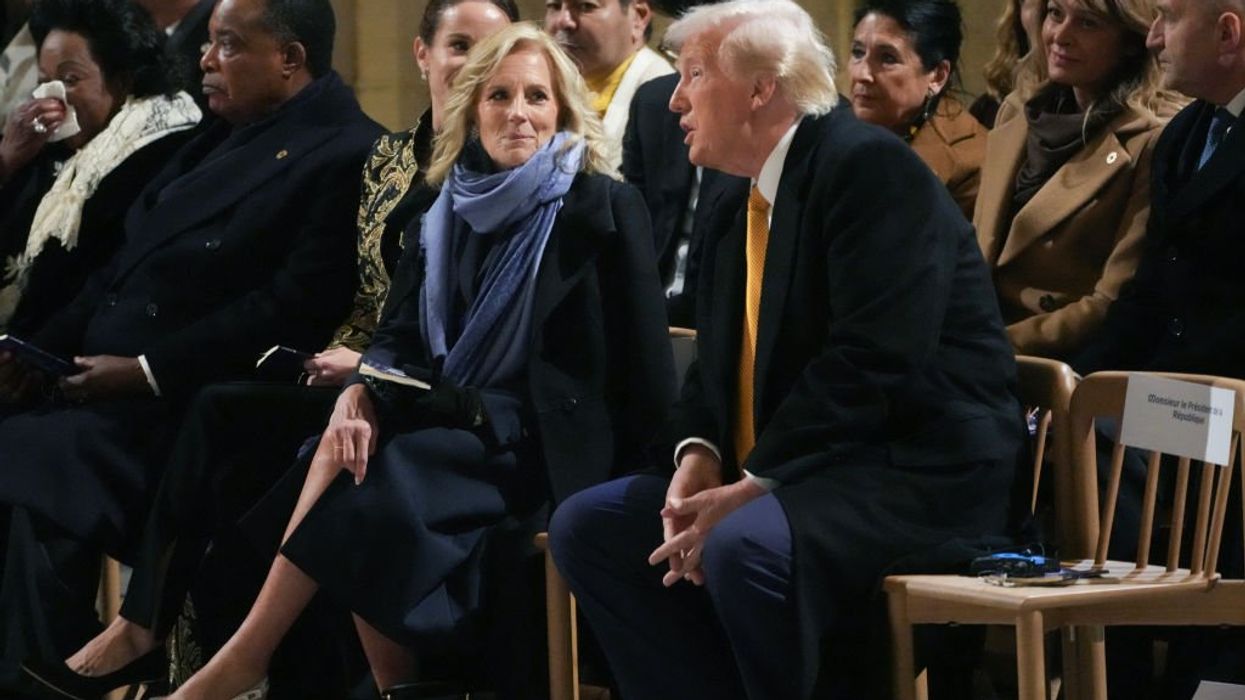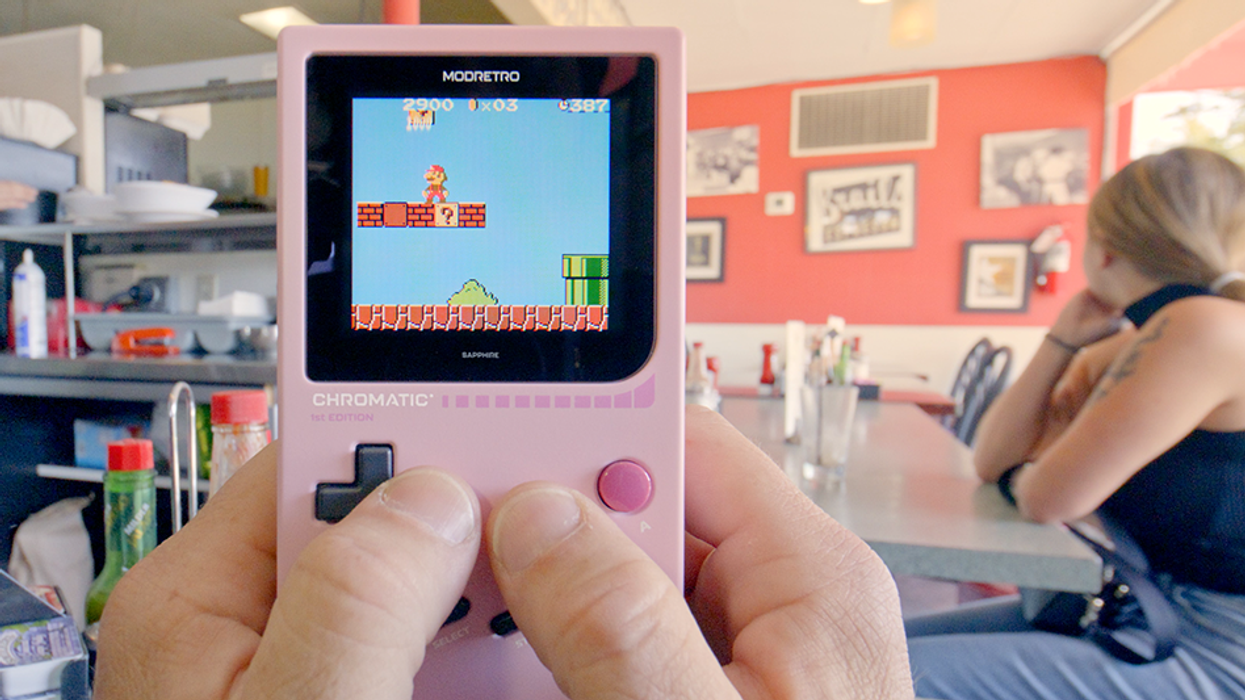
© 2024 Blaze Media LLC. All rights reserved.
This Is the Video of French President Sarkozy 'Ignoring' British PM's Handshake
December 09, 2011
Britain refuses revised treaty to tie its finances to the EU Sarkozy blames British PM David Cameron for split Cameron: "Not in Britain's interest" --
On Friday, the European Union said that 26 of its 27 member countries are open to joining a new treaty tying their finances together to solve the euro crisis. Only Britain remains opposed, creating a deep rift in the union.
The person responsible for Britain's "no" vote is Prime Minister David Cameron. And after the vote, he got a cold reception from one of his major critics -- French President Nicolas Sarkozy.
The cold reception even comes complete with video evidence. In it, it shows a smirked Cameron walking toward Sarkozy, who has just shaken the hand of a woman. As Cameron approaches, he appears to start extending his hand. Sarkozy, however, turns away and leans toward another person. Cameron is left with awkwardly trying to cover up the attempt, and instead pats Sarkozy on the shoulder:
This is how the Express described it:
NICOLAS Sarkozy demonstrated exactly what he thought of David Cameron's decision not to sign the new EU treaty today as he gave the British PM the cold shoulder.The French President walked straight past Cameron, choosing to avoid having to shake his hand and instead turned to talk to another member at the proceedings.
Sarkozy openly blasted David Cameron for his earlier decision not to accept the treaty.
And this is what the Telegraph had to say:
There are plenty of strands to explore while the dust settles, but one of the juiciest is the state of relations between Paris and London. That BBC slo-mo footage being played on a loop of David Cameron's tight-lipped smile as Nicolas Sarkozy ignores him tells a great story. A while back I relayed the Team Dave view that whatever was said in moments of passion, Sarko and the PM had forged an unshakeable bond of friendship through their shared effort in Libya. This morning, that tune has changed[...]
The French narrative of the crisis is that it is all an Anglo-Saxon creation, and we must be punished for it. The failings of the euro so obvious to us are not recognised by the French. The British view is that packing the treaty proposals full of changes that Britain could never conceivably accept was a ploy to force us into a veto, and so into the departure lounge. Or here's another way of putting from inside the machine: "The French are out to screw us," one source tells me. "Despite all the jollity, the fact is that Sarko doesn't gives a s*** about us. It's all bull***. They have their view that the Anglo-Saxon model is a disaster and was responsible for the crisis."
In marathon overnight talks, the 17 countries that use the euro gradually persuaded nearly all the others to consider joining the new treaty they would create. Some of those countries may face parliamentary opposition to the treaty, which would allow for unprecedented oversight of national budgets.
"Except for one, all are considering participation," EU President Herman Van Rompuy told reporters after the summit ended. "I'm optimistic because I know it is going to be very close to 27."
A document released near the end of a high-stakes EU summit Friday said the leaders of nine of the 10 EU countries that don't use the euro "indicated the possibility to take part in this process after consulting their parliaments where appropriate."
Stocks and the euro nevertheless climbed on the news of the new treaty, even though it offers only a long-term solution and no immediate salve for a crisis that started in Greece, then plunged the whole eurozone into crisis and now threatens the global financial system.
While the deal could help save the euro, the political implications of the rift could be enormous. Germany and France had hoped to persuade all 27 EU countries to agree to change the treaty that governs their union. But Britain, which doesn't use the euro, firmly said no.
Britain's leaders argued that the revised treaty would threaten their national sovereignty and damage London's financial services industry. Germany and France, the eurozone's biggest economies, made clear that a deal among the 17 euro countries and whoever else wanted to join was better than nothing.
Hungary, the Czech Republic and Sweden said they would need to consult their parliaments, while the other six countries outside the eurozone - Denmark, Poland, Bulgaria, Romania, Latvia, Lithuania - agreed they wanted to join.
EU leaders expressed disappointment that Britain stayed out.
French President Nicolas Sarkozy blamed the split on British Prime Minister David Cameron.
"David Cameron made a proposal that seemed to us unacceptable, a protocol to the treaty that would have exonerated the United Kingdom from a great number of financial service regulations," Sarkozy said shortly before dawn, after what he called a "difficult" dinner meeting had dragged through the night.
Cameron defended his stance.
"What was on offer is not in Britain's interest so I didn't agree to it," he said. "We're not in the euro and I'm glad we're not in the euro. We're never going to join the euro and we're never going to give up this kind of sovereignty that these countries are having to give up."
The head of the International Monetary Fund, Christine Lagarde, welcomed the deal on a new treaty as "an important contribution to helping address the crisis facing the euro zone and strengthening the global economic recovery."
Van Rompuy said the eurozone, together with some other EU countries, would provide up to euro200 billion ($268 billion) in extra resources to the IMF, to be used to help European countries in dire straits. Non-euro countries Sweden and Denmark are among those contributing.
Swedish Prime Minister Fredrik Reinfeldt, a non-euro country, suggested to The Associated Press that Swedish participation was not guaranteed.
"It would be very odd signing up to a treaty ... as if we were a eurozone country. And that was never the aim," he said. "If the eurozone has problems these become also Swedish problems."
The new agreement - and the new rift - came on a now-clouded anniversary, 20 years to the day after the treaty that led to the creation of the euro was drafted. That agreement, in turn, grew out of ambitious post-World War II efforts to unite a bloodied continent.
Governments participating in the new treaty agreed to have balanced budgets, calculated as an annual "structural" deficit of no greater than 0.5 percent of gross domestic product. During economic slumps, when tax receipts fall and spending may rise to stimulate growth, governments will be allowed to temporarily run slightly higher deficits, of up to 3 percent.
An unspecified "automatic correction mechanism" will punish countries that break the rules.
To prevent excessive deficits, countries will have to submit their national budgets to the European Commission, which will have the authority to request that they be revised. Countries will also have to report in advance how much they plan to borrow.
After a brief morning break, the leaders were back in meetings Friday to work out the details of their new "intergovernmental accord," including specifying how violators will be prosecuted. They want it written by March.
Complicating their negotiations, Cameron threatened to prevent EU bodies, such as the European Commission and the European Court of Justice, from taking on responsibilities of enforcing treaties made by fewer than all 27 members.
"The institutions of the European Union belong to the European Union, belong to the 27" member states, he said.
Germany and France insist that the best way to regain market trust is to beef up financial governance of the eurozone countries and their budgets.
But most economists agree that won't be enough: To regain the trust of investors in the short term, they say, the eurozone needs to have enough money on hand to guarantee that countries won't default on their debts.
There was no immediate agreement on boosting the eurozone's own bailout funds, meant to rescue countries having trouble refinancing their debts. In their statement, the currency union's leaders put it off until March to decide whether their rescue funds need to be able to provide more than euro500 billion in help to struggling countries.
The Associated Press contributed to this report.
Want to leave a tip?
We answer to you. Help keep our content free of advertisers and big tech censorship by leaving a tip today.
Want to join the conversation?
Already a subscriber?
more stories
Sign up for the Blaze newsletter
By signing up, you agree to our Privacy Policy and Terms of Use, and agree to receive content that may sometimes include advertisements. You may opt out at any time.
© 2024 Blaze Media LLC. All rights reserved.
Get the stories that matter most delivered directly to your inbox.
By signing up, you agree to our Privacy Policy and Terms of Use, and agree to receive content that may sometimes include advertisements. You may opt out at any time.



